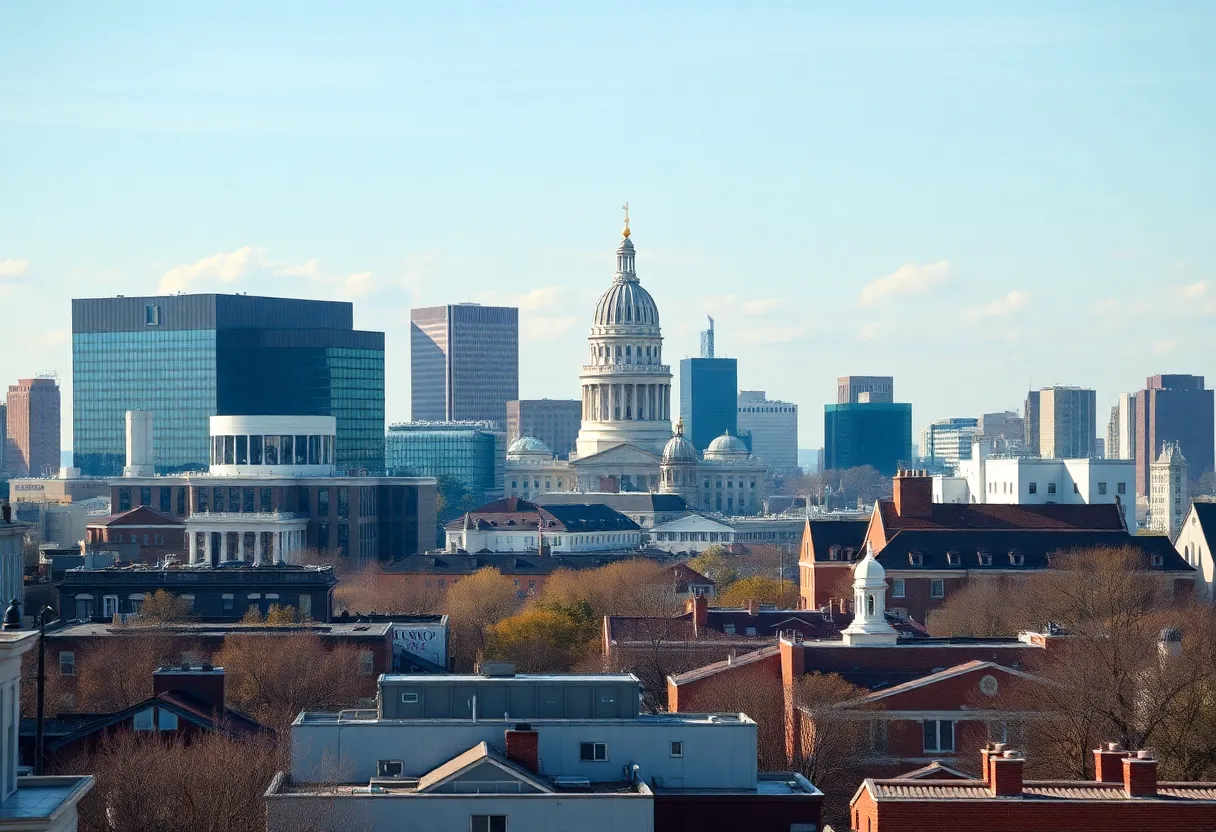Boston, August 19, 2025
News Summary
Boston has formally rejected a federal ultimatum from the Department of Justice to change its immigration enforcement practices. Mayor Michelle Wu’s office defended the city’s sanctuary policies, which limit local police cooperation with federal immigration agents. The rejection of these demands comes as the DOJ threatens various actions against jurisdictions failing to comply by a set deadline. Boston officials maintain that the sanctuary policies contribute to public safety and align with legal constraints set by the Massachusetts Supreme Judicial Court.
Boston — The city has formally rejected a federal demand to change local immigration enforcement practices ahead of a Department of Justice deadline tied to sanctuary jurisdictions.
Key development: Boston refuses to comply with federal ultimatum
Mayor Michelle Wu’s office submitted a written response to the Department of Justice (DOJ) rejecting a federal demand that cities alter their sanctuary policies by the August 19 deadline. The mayor’s office defended Boston’s current approach and stated the city will continue to apply its local public safety laws, including the Boston Trust Act, rather than accede to federal requirements to honor immigration detainers absent criminal warrants.
Immediate consequences and federal actions
The DOJ, through letters issued earlier in August by U.S. Attorney General Pam Bondi, gave 35 jurisdictions nationwide until August 19 to submit compliance plans. The letters accused sanctuary policies of obstructing federal immigration enforcement and threatened actions that include withdrawal of federal funding, potential civil lawsuits, and possible prosecution of local officials for interfering with federal immigration laws. The Trump administration’s stated objective in the action is to secure local cooperation with U.S. Immigration and Customs Enforcement (ICE) detainers.
What Boston’s policy requires
The Boston Trust Act limits local police cooperation with federal immigration agents. Under the city law, police are not to hold people on the basis of civil immigration detainers alone; cooperation with federal agents requires a criminal warrant. Boston city leaders have linked these policies to public safety strategies and maintained that community policing and partnerships support the city’s crime prevention efforts.
Mayor’s position and local response
Mayor Wu framed the city’s written reply as a defense of local law and public-safety priorities, indicating Boston will maintain sanctuary-style protections for immigrant residents. She delivered the position at a press conference alongside local and state leaders who criticized the DOJ action as coercive and constitutionally questionable. City officials and community supporters argued that immigrant residents contribute to public safety and the local economy, and they rallied in support of continuing current policies.
Legal context and state restrictions
A Massachusetts Supreme Judicial Court ruling is relevant to the dispute because it prohibits state and local police from holding people solely on civil immigration detainers. Boston officials cited that state ruling in asserting the legality of the city’s approach. That state-level legal constraint means local law enforcement in Massachusetts faces limits on honoring federal immigration detainers without judicial warrants or other qualifying criminal process.
Scope beyond Boston
The DOJ letters targeted 35 sanctuary jurisdictions nationwide. States and localities specifically noted as under federal scrutiny include Connecticut, Vermont, and Rhode Island, among others. The federal action underscores a broader clash between the Trump administration’s immigration enforcement priorities and cities or states that have adopted policies limiting local participation in federal immigration operations.
Why this matters
The dispute raises questions about federal leverage over local governments, the role of local police in immigration enforcement, and how public safety is defined and maintained in cities with large immigrant populations. Potential outcomes include litigation between the federal government and affected jurisdictions, reallocation or withholding of federal funds, and further political mobilization at local and state levels.
Next steps and likely path
Boston’s written refusal sets the stage for possible DOJ follow-up actions such as civil suits or funding challenges. City officials emphasize continued cooperation with federal law enforcement on criminal matters unrelated to civil immigration detainers while preserving protections that restrict honoring ICE detainers without a criminal warrant. Observers expect legal and political battles to continue as both sides map out enforcement, litigation, and public messaging strategies.
Short checklist for residents
- Boston will continue to apply the Boston Trust Act to local policing and immigration cooperation.
- DOJ has threatened funding withdrawal and legal action; impacts will depend on any follow-up federal steps.
- Massachusetts state court rules limit local compliance with civil immigration detainers.
- Other states and cities are facing the same federal demand; outcomes may vary jurisdiction by jurisdiction.
Frequently Asked Questions
What did the Department of Justice require?
The DOJ required 35 jurisdictions to submit plans showing compliance with federal immigration enforcement, specifically to honor ICE detainers, by the August 19 deadline and warned of potential funding cuts, civil suits, and other enforcement actions for noncompliance.
How did Boston respond?
Boston submitted a written response defending the Boston Trust Act and stating it will not comply with federal demands to change local policy on immigration detainers, while continuing cooperation with federal law enforcement on criminal matters.
What does the Boston Trust Act do?
The Boston Trust Act restricts local police from holding people on civil immigration detainers alone and permits cooperation with federal agents only when a criminal warrant or other lawful basis exists.
What legal limits apply in Massachusetts?
A Massachusetts Supreme Judicial Court ruling prevents state and local police from detaining individuals based solely on civil immigration detainers, reinforcing local policy limits on honoring ICE requests without a criminal warrant.
What could happen next?
Potential next steps include DOJ civil litigation, federal funding actions, or political and legal challenges. The precise effects will depend on any formal moves the DOJ takes after reviewing local responses.
Quick Reference
| Item | What it means | Status / Deadline |
|---|---|---|
| DOJ deadline | Final date for jurisdictions to submit compliance plans | August 19 (deadline set in DOJ letters) |
| Boston Trust Act | Local law limiting police cooperation with federal immigration detainers | In effect; cited by city in response to DOJ |
| Federal threats | Possible withdrawal of federal funds, civil suits, and prosecution of officials | Potential actions pending DOJ review |
| Mass. court ruling | State Supreme Judicial Court bars holding people on civil detainers alone | Existing legal constraint on local police |
| Other jurisdictions affected | States and cities across the U.S. received similar DOJ letters | Includes Connecticut, Vermont, Rhode Island and others |
Deeper Dive: News & Info About This Topic
HERE Resources
Massachusetts Commission Unveils Antisemitism Education Recommendations
Boston Mayor Defends Sanctuary Policies Amid DOJ Deadline
Boston Leaders Stand Firm on Sanctuary Policies Amid Federal Pressure
Boston Sees Record Homicides as Crime Rates Shift
Trump Amplifies Federal Policing in Washington, D.C.
Boston City Councilor Expresses Frustration Over Cancelled Hearing on CORI Policy
Boston City Employee with Criminal History Resigns
Massachusetts Health Care Providers Advocate for Immigrant Access
Boston Mayor Faces Challenges with Federal Grant and Trust Act
Boston Designated as Sanctuary Jurisdiction by DOJ
Additional Resources
- NBC Boston
- Wikipedia: Sanctuary city
- The Hill
- Google Search: Boston sanctuary city policies
- Boston 25 News
- Google Scholar: Boston immigration policy
- BU News Service
- Encyclopedia Britannica: Immigration
- Boston Herald
- Google News: Boston immigration policies

Author: STAFF HERE BOSTON WRITER
The BOSTON STAFF WRITER represents the experienced team at HEREBoston.com, your go-to source for actionable local news and information in Boston, Suffolk County, and beyond. Specializing in "news you can use," we cover essential topics like product reviews for personal and business needs, local business directories, politics, real estate trends, neighborhood insights, and state news affecting the area—with deep expertise drawn from years of dedicated reporting and strong community input, including local press releases and business updates. We deliver top reporting on high-value events such as Boston Marathon, Head of the Charles Regatta, and Boston Harborfest. Our coverage extends to key organizations like the Greater Boston Chamber of Commerce and Associated Industries of Massachusetts, plus leading businesses in finance, biotech, and insurance that power the local economy such as Fidelity Investments, Biogen, and Liberty Mutual Insurance. As part of the broader HERE network, we provide comprehensive, credible insights into Massachusetts's dynamic landscape.



